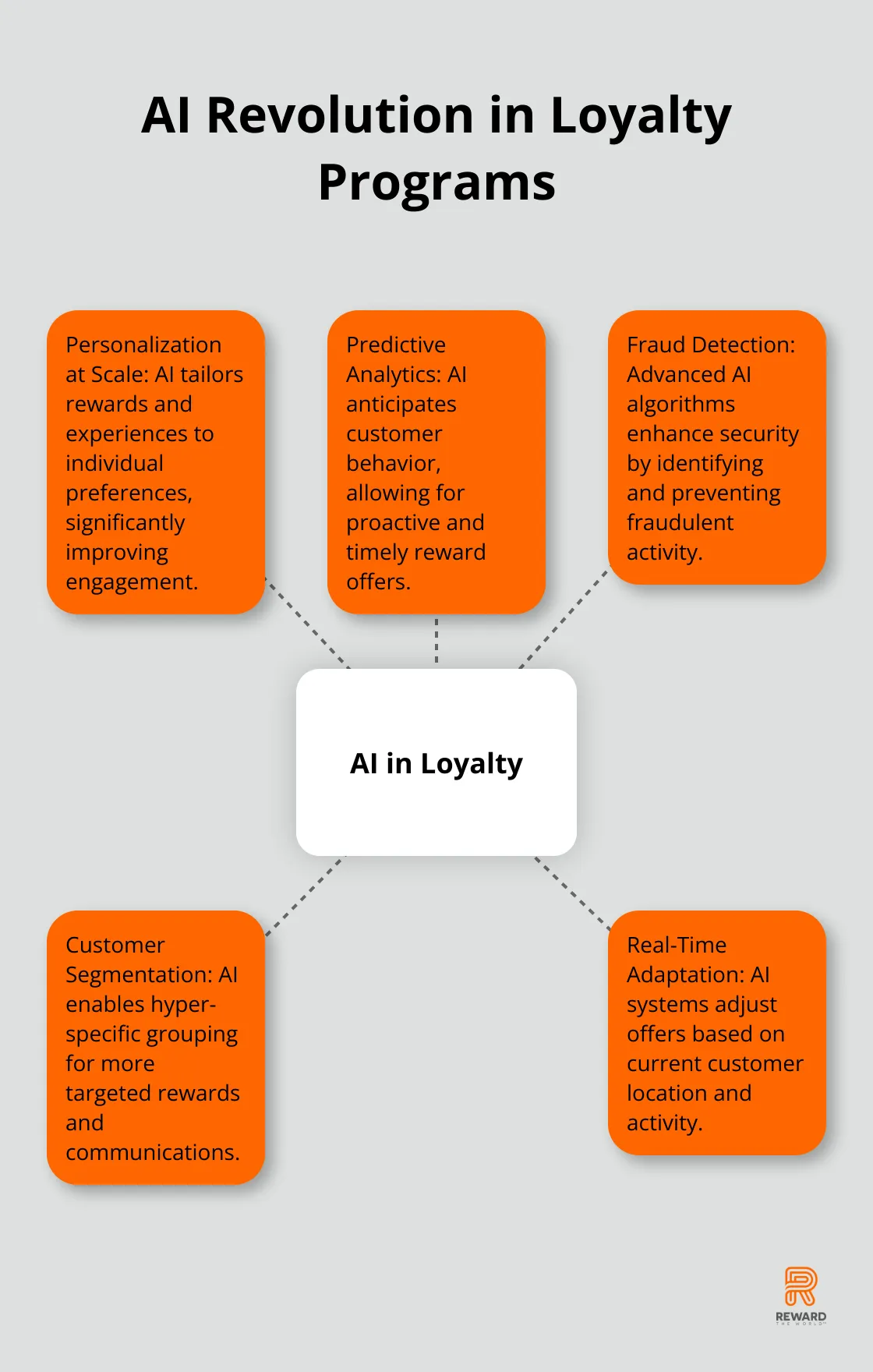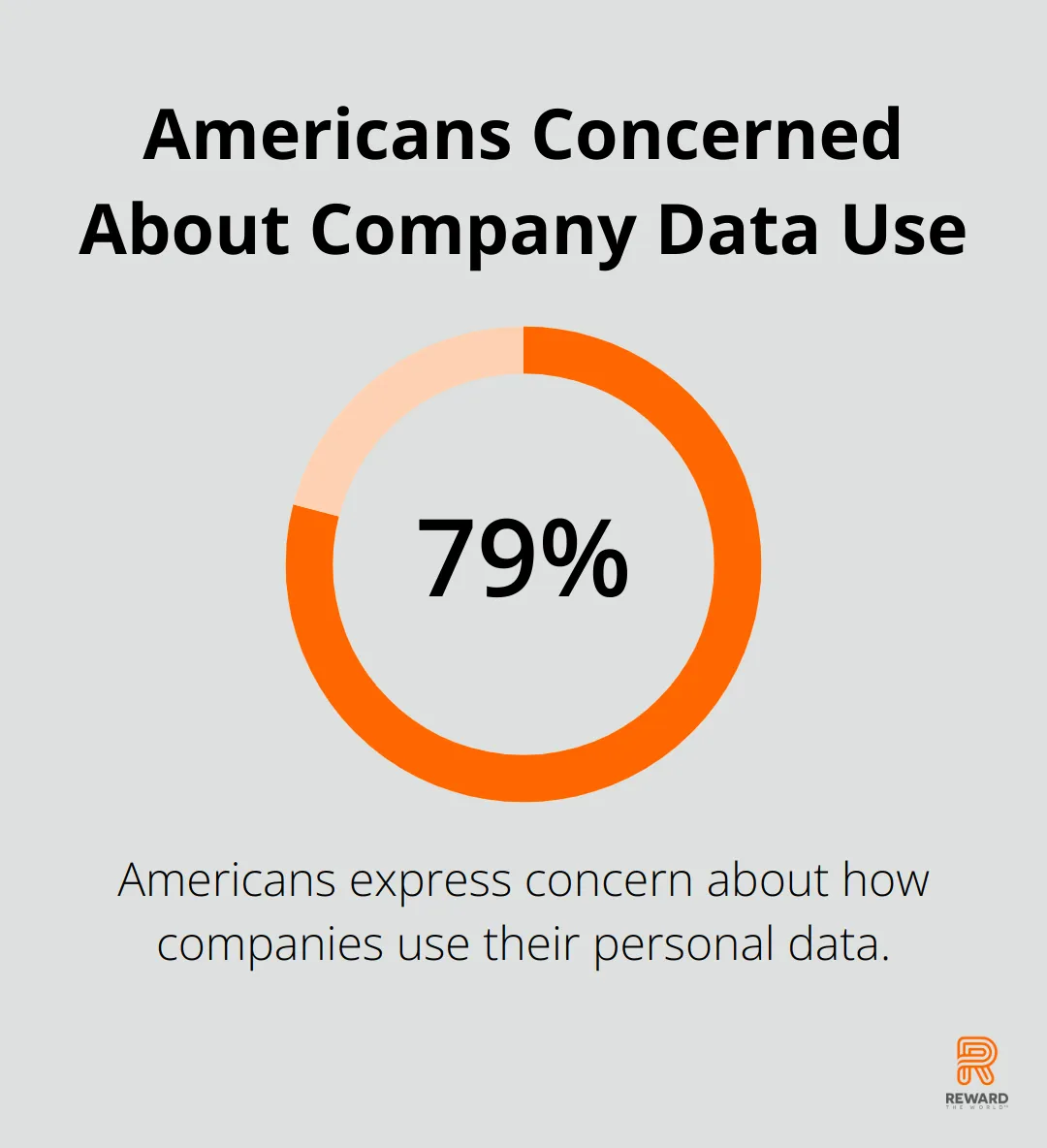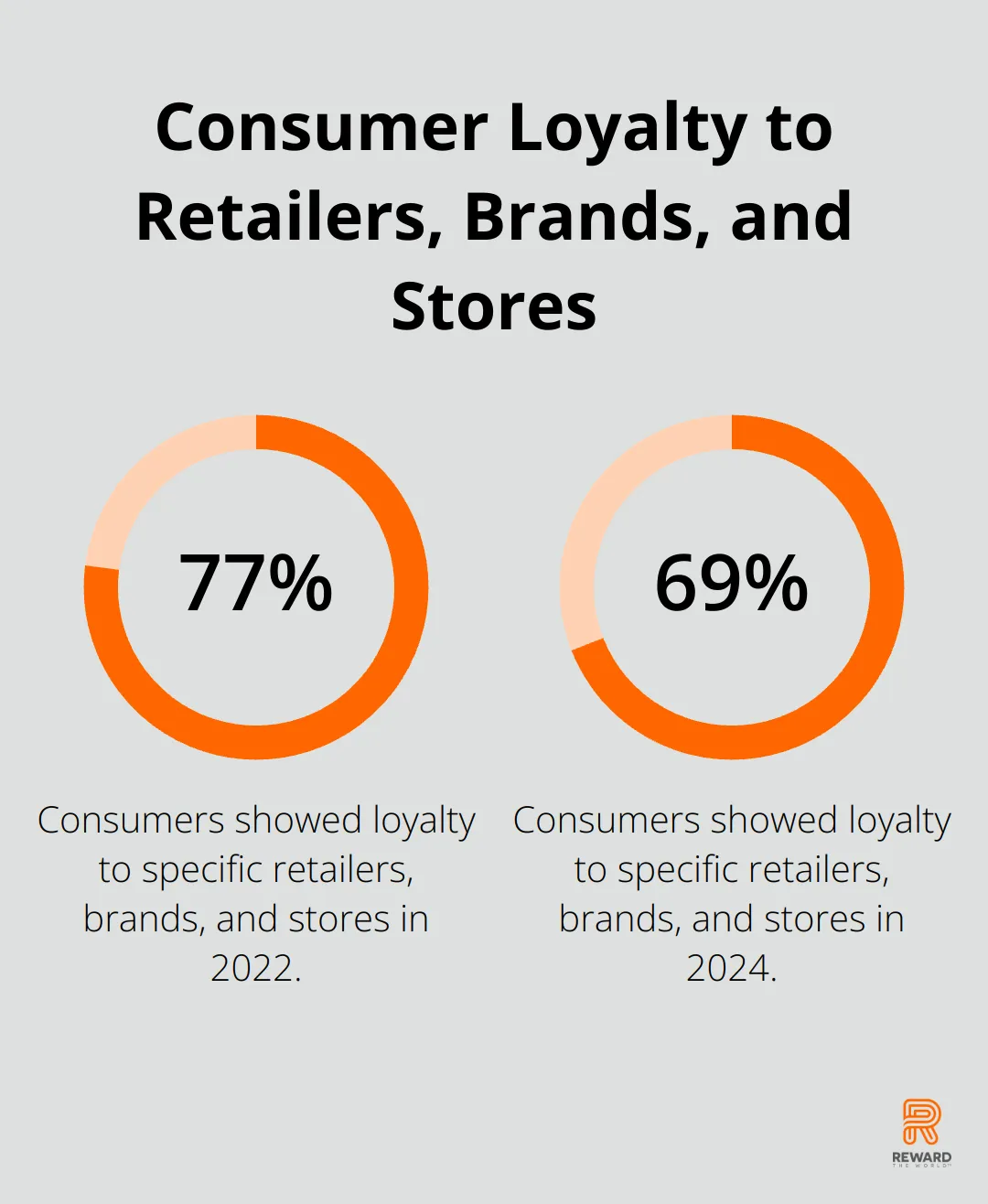
AI-powered loyalty programs are reshaping customer engagement strategies across industries. These innovative systems promise personalized rewards and seamless experiences, but they also raise important ethical questions.
At Reward the World, we’re exploring the complex intersection of AI technology and consumer loyalty. This post examines the potential ethical concerns surrounding AI in loyalty programs and discusses how companies can balance innovation with responsible AI ethics.
How AI Transforms Loyalty Programs
AI revolutionizes loyalty programs, offering unparalleled personalization and efficiency. Major players like Starbucks and Amazon lead the charge, using AI to create tailored experiences that keep customers coming back.
Personalization at Scale
Starbucks uses artificial intelligence to boost its rewards program effectiveness, incentivizing consumers to spend more and visit more frequently. This customization has improved their loyalty program engagement significantly.

Amazon uses personalized product recommendations as a marketing technique to help improve sales and continue satisfying customers by anticipating their needs.
Predictive Analytics for Proactive Rewards
Sephora’s Beauty Insider program uses AI to predict a customer’s next purchase timing. They send perfectly timed offers, increasing conversion rates.
Fraud Detection and Prevention
AI algorithms detect fraudulent activity in loyalty programs with increasing sophistication.
AI-Powered Customer Segmentation
AI enables hyper-specific customer segmentation, allowing companies to tailor rewards and communications to distinct groups. AI analyzes customer data to create personalized rewards and offers more relevant to each individual.
Real-Time Personalization
AI systems adapt in real-time to customer behavior. Loyalty programs use AI to adjust offers based on a member’s current location and activity.
While AI offers clear benefits, companies must navigate the ethical implications of using customer data to power these systems. The next section will explore these important considerations, highlighting the need for responsible AI implementation in loyalty programs.
The Dark Side of AI-Powered Loyalty
AI-powered loyalty programs raise serious ethical concerns. These issues extend beyond mere data collection, touching on fundamental questions of consumer autonomy and fairness.
The Privacy Paradox
Companies collect vast amounts of personal data to fuel AI-driven loyalty programs. This data includes purchase history, browsing behavior, and even location information. While this enables hyper-personalized experiences, it also creates significant privacy risks.
A 2023 study by the Pew Research Center found that 79% of Americans express concern about how companies use their personal data. Yet, many still participate in loyalty programs, creating a privacy paradox.

Businesses must navigate this carefully. Transparent data policies and robust security measures are essential. Many companies now implement GDPR-compliant practices and offer clear opt-in/opt-out mechanisms for data collection.
Personalization vs. Manipulation
AI-powered loyalty programs excel at predicting and influencing consumer behavior. This raises ethical questions about the line between personalization and manipulation.
A 2024 report from the MIT Sloan Management Review highlighted cases where AI systems exploited psychological vulnerabilities to drive purchases. For instance, some programs used dynamic pricing to charge loyal customers more, banking on their brand attachment.
To avoid crossing ethical lines, companies should prioritize customer benefit over short-term profits. Loyalty programs should enhance the customer experience, not exploit it.
The Bias in the Machine
AI systems are only as unbiased as the data they’re trained on. This poses a significant risk of perpetuating (or even amplifying) existing societal biases in loyalty programs.
A 2023 study published in the Journal of Marketing found that AI-driven loyalty programs often favored high-income customers, potentially excluding or underserving other demographics.
To combat this, companies must actively audit their AI systems for bias. Diverse data sets and regular testing are crucial. Some forward-thinking businesses even implement “fairness constraints” in their AI algorithms to ensure equitable treatment across all customer segments.
Ethical AI: A Business Imperative
As AI continues to shape loyalty programs, addressing these ethical concerns becomes not just a moral imperative-it’s a business necessity. Companies that prioritize ethical AI practices in their loyalty programs will likely see increased customer trust and long-term success.
The challenge lies in striking the right balance between innovation and responsibility. The next section will explore how businesses can navigate this complex landscape, ensuring their AI-powered loyalty programs remain both effective and ethical.
How Companies Can Ethically Implement AI in Loyalty Programs
Prioritize Radical Transparency
Transparency forms the foundation of ethical AI use in loyalty programs. Companies must clearly communicate their data collection, usage, and protection practices. A 2024 study by the Customer Data Ethics Institute revealed that 69% of consumers show loyalty to specific retailers, brands, and stores, a drop from 77% in 2022.

Companies should take these practical steps for transparency:
- Create a clear, jargon-free privacy policy
- Provide an easily accessible dashboard displaying collected data and its usage
- Send regular updates on changes to data practices
Develop and Follow Ethical AI Guidelines
Companies must create and adhere to strict ethical AI guidelines. The IEEE Global Initiative on Ethics of Autonomous and Intelligent Systems recommends that businesses:
- Form an AI ethics board with diverse perspectives
- Perform regular algorithmic audits to detect and mitigate bias
- Set clear boundaries on AI decision-making (especially for high-stakes decisions)
Walmart’s loyalty program serves as a cautionary tale. In 2023, they faced backlash when their AI-driven personalization inadvertently discriminated against certain demographic groups. This incident underscores the importance of rigorous ethical guidelines and continuous monitoring.
Give Customers Control
Companies must provide customers with control over their data and AI interactions. The 2024 Loyalty Program Consumer Rights Act in the EU mandates that companies offer:
- Simple opt-out options for AI-driven personalization
- The ability to view and delete personal data
- Clear explanations of how AI influences rewards and offers
Target’s loyalty program exemplifies this approach. They allow customers to choose their level of personalization (from fully AI-driven to minimal data sharing). This resulted in a 22% increase in program participation and a 15% boost in customer satisfaction scores.
Implement Robust Data Security Measures
Companies must protect customer data with state-of-the-art security measures. This includes:
- Regular security audits
- Encryption of sensitive data
- Strict access controls for employee data handling
A 2025 report by Cybersecurity Ventures predicts that cybercrime costs will reach $10.5 trillion USD annually by 2025. Proactive security measures can significantly mitigate this risk.
Foster Ethical AI Culture
Companies should cultivate a culture of ethical AI use throughout their organization. This involves:
- Regular employee training on AI ethics
- Encouraging open discussions about ethical concerns
- Rewarding ethical decision-making in AI implementation
IBM’s AI Ethics Board (established in 2023) serves as a model for fostering this culture. Their approach led to a 30% reduction in AI-related ethical incidents within their loyalty program.
Final Thoughts
AI-powered loyalty programs offer unprecedented personalization and efficiency, but they also present significant ethical challenges. Companies must prioritize transparency, customer control, and robust data security to build trust and maintain ethical standards. Regular audits, diverse AI ethics boards, and clear communication about data practices will help businesses navigate these complex issues.
The future of ethical AI-powered loyalty systems requires ongoing vigilance and adaptation. As regulations evolve and consumer awareness grows, companies that prioritize AI ethics will gain a competitive edge. These businesses will avoid potential pitfalls and build stronger, more trusting relationships with their customers.
At Reward the World, we understand the importance of balancing innovation with ethical considerations. Our global incentives platform helps businesses enhance customer loyalty while adhering to high standards of data protection and AI ethics. We remain committed to providing solutions that respect consumer rights and foster genuine, mutually beneficial relationships between businesses and their customers.
